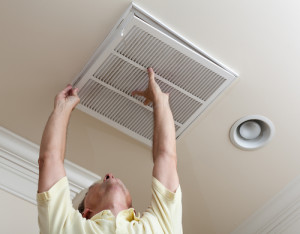If you’re familiar with our blogs, that good ventilation can prevent mould is probably not news to you. Like adequate heating, good humidity control, and effective insulation, having sufficient ventilation is one of the most important things you can do to help prevent mould in your house.

Ventilation describes how fresh air moves in your home. Fresh air can move through your home using fans (often seen in the kitchen and washroom) as well as through open windows and doors. The key to good ventilation is to constantly have dry, fresh air circulating the damp air out of the home.
How does ventilation help? When warm air comes in contact with cold windows or exterior walls, it loses some of its ability to hold onto water. The water then leave its vapour state and forms droplets on the surface. Just like a fan or cool wind helps to evaporate sweat, a well ventilated home will whisk those drops back into the air. Without moisture clinging to the surface for at least 24 hours, mould cannot grow. Good ventilation also bring in oxygen rich air to replace stagnant carbon dioxide filled air and reduces odors.
How can you increase ventilation? As we previously note, many kitchens and bathrooms already have mechanical fans and ventilation. If your’s doesn’t, that’s probably a good place to start. Laundry rooms are another area of the house that often has a lot of moisture. Another way to ventilate your house is to open a few windows for five minutes. You’ll want the windows fully open so that lots of air is exchanged quickly, and leaving a window cracked for several hours is not a viable other option. Cracking a window for hours does not help with ventilation, but does lower the overall temperature of your home. This means you’ll be wasting energy to keep your home warm and that even more water will turn to droplets as it touches cold surfaces.
Adequate ventilation is important for preventing mould, but it isn’t the only way to keep your home dry and safe from mildew. Good ventilation also isn’t a guarantee if other factors like humidity aren’t controlled.
Wondering if your home is at risk for mould? Contact the experts at Amity Environmental today!

